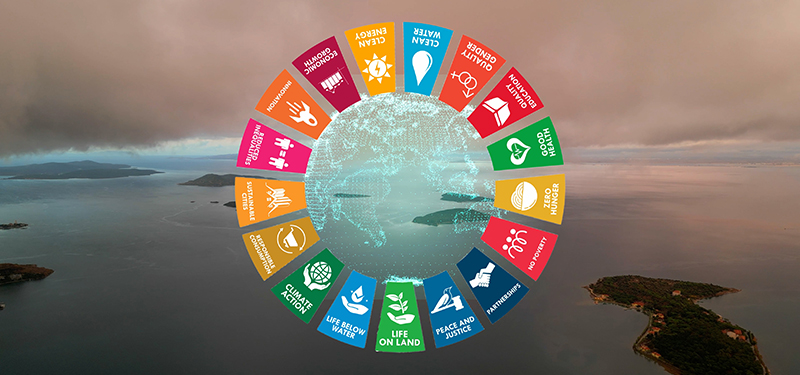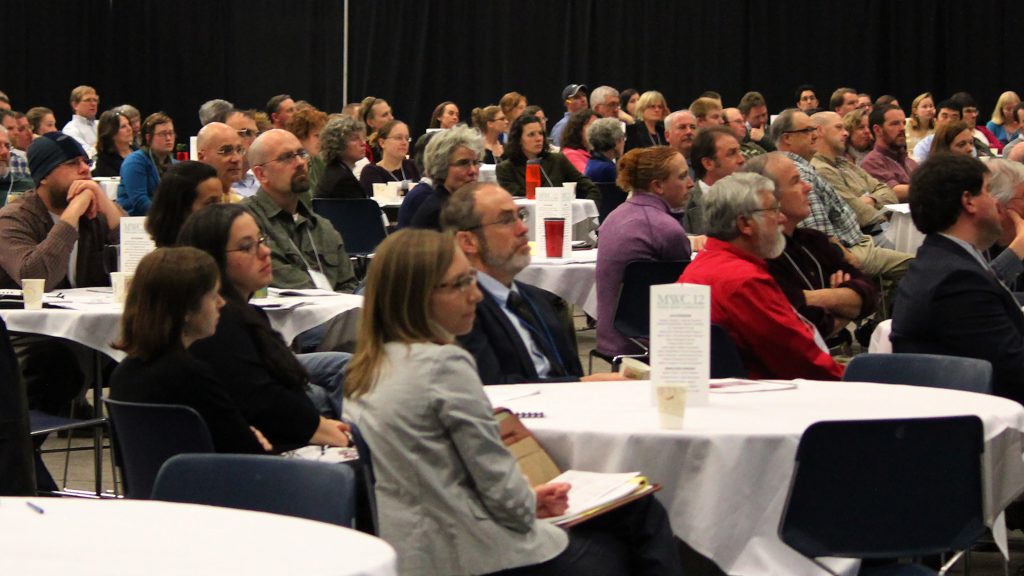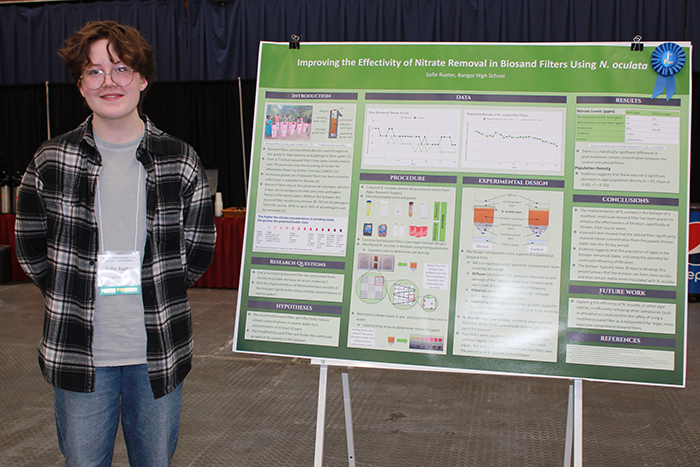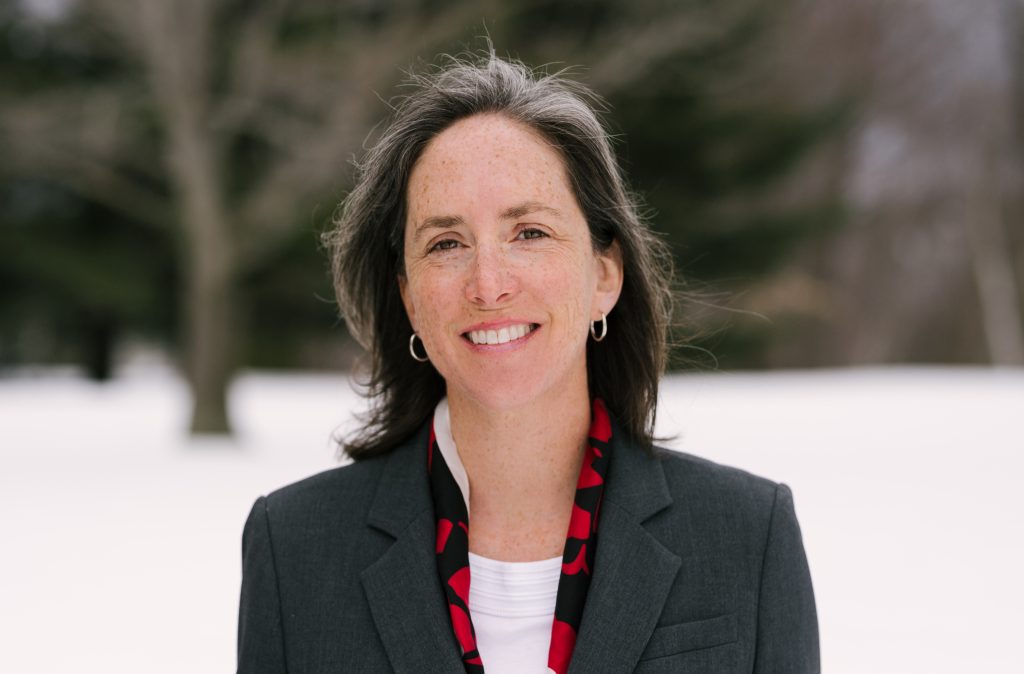We Need This More Than Ever: Perspectives from the 2025 Maine Sustainability & Water Conference

Story by Sonja Heyck-Merlin
Earlier this spring, nearly 600 people gathered at the Augusta Civic Center for the 30th Maine Sustainability & Water Conference.
The annual conference provides a forum where professionals, researchers, consultants, citizens, students, regulators, and planners gather to share information and present new findings on sustainability and water resource issues in Maine.
Some participants locked in on a single issue for the entire day, such as the Marshes for Maine’s Future session. Others moved between the rooms, distilling information from a broad range of topics — community efforts to cope with the impacts of climate change, using discarded Christmas trees for coastal dune restoration, and efforts to reduce derelict fishing gear.
Some people may have missed some presentations because they finally had the opportunity to catch up with a colleague they don’t often get to see in person.
Parker Gassett, assistant director of the Maine Climate Science Information Exchange Office said, “I think of the conference as a part of my spring phenology. Every year, it’s like a wake up call that I’ve put my head down and worked hard on an issue over the winter. I come out of my silo at the conference when I get to see all the other issues that people are working on. It’s the premier chance, especially in my sector of climate change, for people to connect about the state of resources, tools, activities, and climate action in the state. I have never considered not going.”

David Courtemanch, a volunteer freshwater science and policy analyst for The Nature Conservancy, serves on the conference committee and has been attending the conference since before the Mitchell Center existed. “When we first started there might have been 100 people and this year it was around 600. It’s amazing the way the conference has grown,” he said. Like Gassett, Courtemanch values reconnecting with friends and colleagues in a post-COVID world where Zoom meetings have become the norm.
“The ability to come together in person is so invaluable. We don’t have many of these opportunities these days. I’m able to connect with people that I might not usually cross paths with,” concurred Wendy Garland, director of the Water Bureau’s Division of Environmental Assessment at the Maine Department of Environmental Protection.
Garland has served as a judge for the poster session for years, an opportunity that she always looks forward to. Each year, the civic center’s main room is peppered with colorful and detailed student posters that highlight and summarize their research — from the high school to doctoral level. A few of this year’s posters included research on juvenile river herring in the Kennebec River, the impacts of climate language on rural Maine community resilience initiatives, and supporting sustainability in Maine’s beer brewing industry.

The cofounder of the Onion Foundation, Susan Onion, also appreciates the posters. The Onion Foundation is a philanthropic organization, providing grants for the arts and the environment. Onion said, “This model where attendees can talk with students and interact is so important to them. Students need this opportunity,especially having come up through COVID and all the moments of the virtual world, to have the chance to learn how to present and learn how to interact with people.”
UMaine student Deborah Alademehin presented a poster at this year’s conference. Alademehin is pursuing a doctorate in wildlife ecology and shared her research about the capacity of ice fishing to provide sustenance for Mainers during a likely future of scarcity, simplification, and strife. This was her second year at the conference, and she’s observed how it bridges the gap between students and professionals.
The conference’s location in Augusta provides Alademenhin with access to professionals that she might otherwise not meet, another reason why she likes the conference. “Most people think of offering conferences in Portland. The Mitchell Center looked for the middle ground for people coming from the northern and southern parts of the state. The venue was made for the conference,” Alademenhim said.
It’s this idea — that people come from across the state, bringing with them their regional and local insights — that Karen Wilson values about the conference. Wilson is an associate professor with the Department of Environmental Science and Policy at the University of Southern Maine. “You get to hear about the experiences of people working three towns over from you. It’s an opportunity to find out about how big issues like salt marsh restoration, for example, are playing out at the regional level,” she said.
Bea Van Dam first attended the conference as a graduate student presenting research in the poster session. In the years since, she has served as a presenter, poster judge, volunteer, and general attendee. Van Dam is currently a postdoctoral research associate with the UMaine Watershed Process and Estuary Sustainability Research Group.

Like Wilson, Van Dam looks forward to catching up on new developments around the state. What stood out to her this year at the conference was Samantha Horn’s lunchtime keynote address called Finding Each Other: Networks as a Source of Strength in Uncertain Times. In 2024, Governor Mills appointed Horn as director of the newly established Maine Office of Community Affairs.
“I think there was even more of a sense in the room this year than past conferences that it is important for us to all come together and make connections as a community if we want to keep solving big problems across the state,” said Van Dam.
Chris Feurt, coastal resilience scientist at Wells National Estuarine Research Reserve, has been to every single Maine Sustainability & Water Conference. She loves every aspect of the conference: the networking, posters, and keynote.
“It’s the one place people from all over the state can get together and share diverse experiences together. It’s so important for the state. And it’s affordable. Unlike other conferences that might cost hundreds of dollars to attend, people can just drive for the day and interact with colleagues and students in a way that’s really important,” Feurt said.
David Hart, director of the Mitchell Center said, “The Sustainability & Water Conference continues to serve as a testament to the power of community. For 30 years, it has brought together voices from every corner of Maine to listen, learn, and work together to enhance the well-being of people and the natural world.”
